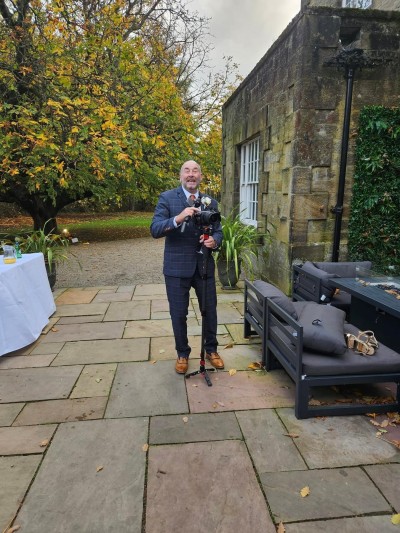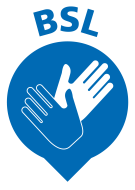
A father of the bride was able to lead his daughter down the aisle just a day after he had a stroke thanks to the life-saving actions of his wife and NHS.
Martin Simpson had just finished his morning fitness routine at his home in South Shields when his wife Alison realised he was unwell.
She dialled 999 and an ambulance rushed the 64-year-old to Sunderland Royal Hospital.
There, he was given medicine to get rid of blood clots on his brain, which is known as thrombolysis.
A stroke is when blood stops flowing to part of the brain. It affects speech and movement and needs urgent medical help in hospital because it can be life-threatening.
Following tests and scans, Martin was taken to the RVI in Newcastle in case he needed surgery. Thankfully, the team there found the drug treatment had worked and he was transferred back to Sunderland to recuperate.
After a night on E58, the hospital’s acute stroke ward, Martin was well enough to be discharged.
It meant he was able to make the marriage ceremony of his daughter Emily and her now husband Scott Phinn.
Emily, 27, works as an early learning practitioner, while Scott, 29, is a retail manager in the motor industry. They exchanged vows at Shotton Grange, in Seaton Burn, on Thursday, October 31.
Martin, who was born in Sunderland Royal Hospital and is originally from Whitburn, retired two years ago
He has shared his experiences after contacting South Tyneside and Sunderland NHS Foundation Trust (STSFT) with a note of thanks to the team who treated him. He also sent on photos to share of his family’s special day.
The North East Ambulance Service (NEAS), which helped get Martin the swift hospital care he needed, has also stressed how vital it is to act and get treatment quickly.
In his message to those who cared for him, he said: “The staff were amazing and this was so reassuring for me, as my daughter got married the next day.
“I never thought it was something that I may miss out on.
“Because of your team’s dedication, I was able to walk my daughter down the aisle, just a day after having my stroke.
“The day was amazing, so thank you all, you worked miracles for me.”
Martin, a keen photographer and videographer, managed to film the day’s events, while Hope Visual Productions, captured the moment Martin was able to walk Emily down the aisle.
Martin said: “I was at home when the stroke began, after just finishing my usual morning press ups.
“I was totally unaware anything was wrong and thought my wife was massively overreacting by calling 999 for an ambulance.
“We had a very busy day ahead, as I had a mountain of video camera equipment to set up for the big day and thought I was fine.
“My wife however, noticed all the tell-tale signs straight away, and despite assurances from me that I was fine, wouldn't listen and called 999.
“The ambulance arrived in record-breaking time and whisked me up to Sunderland with the blues and twos going. The team there rushed me through the system and gave me thrombolysis.
“After a good few more tests and scans, I was then rushed up to the RVI in case I needed surgery. After the tests at the RVI showed I had improved, and the clot-busting drug had worked, I was returned to Sunderland for overnight observation.
“The staff managed to get me all checked out, scanned and a suitable aftercare package sorted with new medication in order to get me to the wedding.
“The groom and best man even came to the hospital to make sure that I got there in time to walk my daughter down the aisle.”
Martin is continuing to recover at home, but has been keeping busy by editing video clips of the day.
Dr Richard Telford is Clinical Director of Rehabilitation and Elderly Medicine, which includes the stroke services run by STSFT.
He said: “We’re delighted to hear Martin is making a good recovery and we and the RVI were able to help him get to such a special occasion for his family. We wish the newlyweds every happiness.
“The swift actions of his wife undoubtedly helped the North East Ambulance Service our team and then those at the RVI get Martin the care and treatment he needed as quickly as possible.
“Strokes have three warning signs, weakness in the face, weakness in the arm or arms and speech problems, where someone might slur their words or sound confused.
“If this happens, it is so important to call 999 as soon as you can. As Martin’s family now know, every second counts.”
Dan Haworth, consultant paramedic for the North East Ambulance Service said: “Every year we respond to around 5,000 patients who are experiencing the symptoms of a stroke across the region. Of this 5,000, roughly 3,000 of these patients are then confirmed to be experiencing a stroke when they get to hospital.
“When someone makes a 999 call with a suspected stroke, getting help fast is critical.
“Everyone, from our emergency operations centre colleagues to our ambulance crews, are trained to be able to identify, triage, and manage strokes but making sure that call for help is made early can make a world of difference to a patient’s outcome.
“Martin’s story is a clear example of how making sure 999 is called quickly, can save lives.
“Thanks to the swift actions of his wife, we were able to get a crew to him quickly and help him begin his journey to recovery.
“We’re so glad to hear that Martin is now on the mend from what was, undoubtably, a very worrying time for him and his loved ones.
“We are even happier to hear that he was able to walk his daughter Emily down the aisle at her wedding.”
More details about strokes, their symptoms, treatment, recovery and causes: https://www.neas.nhs.uk/first-aid-community/emergency-advice/identifying-stroke

